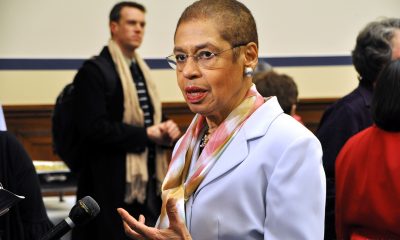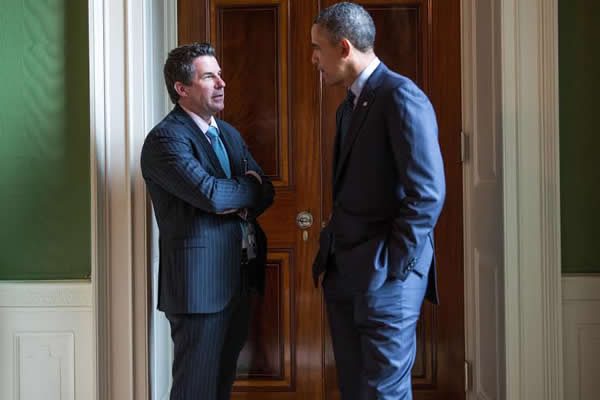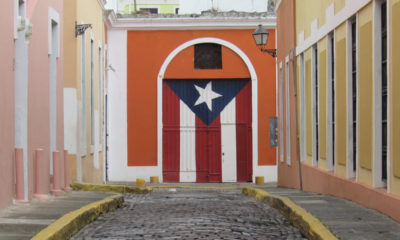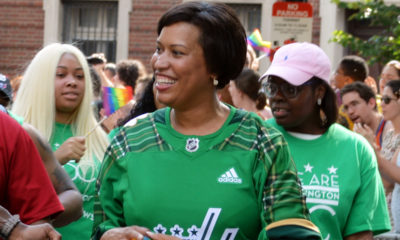Local
Wone’s widow takes the stand
Trial begins with wife’s testimony, chilling 911 tape
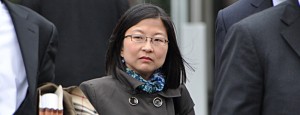
Katherine Wone, wife of slain attorney Robert Wone, testified this week about her husband’s relationship with the three gay men charged in connection with his murder. (Washington Blade photo by Michael Key)
The wife of slain attorney Robert Wone testified this week about her husband’s friendship with three gay men charged with obstructing a police investigation into his murder.
Katherine Wone, who became the government’s first witness Monday in a complex and long-awaited trial, said the couple gave money to a Virginia gay group that Joseph Price, one of the defendants, once chaired.
Price, 39, his domestic partner, Victor Zaborsky, 44, and the couple’s housemate, Dylan Ward, 39, are charged with obstruction of justice, conspiracy to obstruct justice and evidence tampering in connection with Wone’s August 2006 stabbing death in their Dupont Circle area townhouse. No one has been charged with the murder.
If convicted on all three counts, the defendants face a possible maximum sentence of 38 years in prison.
In testimony divided across two days, Katherine Wone said her husband, who became friends with Price during their days as students together at Virginia’s College of William & Mary, arranged to spend the night at the men’s house on Aug. 2, 2006.
She said he planned to work late at his job in D.C. as general counsel for Radio Free Asia and decided not to drive home that night to the couple’s house in Oakton, Va.
“Do you remember Robert saying he and Joe were good friends?” defense attorney Bernard Grimm asked Katherine Wone during cross-examination.
“Yes,” she said.
“Did you ever see a crossed word between Joe and Robert?” Grimm asked.
“No,” she replied.
In response to questions from Grimm, Katherine Wone said her husband was aware that Price was involved with Equality Virginia, a statewide gay civil rights group, and that he supported the cause of equal rights for “all people.”
She told of how she and Robert Wone accepted an invitation from Price to attend an Equality Virginia fundraising dinner in Richmond one year before the murder. And she confirmed that a photo of the Wones and Price that Grimm showed her on the witness stand was taken at the dinner.
The three defendants have said through their lawyers that an intruder killed Robert Wone after entering their house from a rear door while the men slept in their bedrooms. Each of their attorneys stressed during opening arguments that their clients’ friendship with Wone demonstrated they had no motive to harm him and that the government had failed to find a motive for the murder.
But Assistant U.S. Attorney Glenn Kirschner, the lead prosecutor, noted in his opening argument that the men tampered with the crime scene and repeatedly misled police and homicide detectives investigating the murder. He said the defendants know — but refuse to disclose — the identity of the person or people who fatally stabbed Wone in the chest.
Among other things, Kirschner noted that paramedics and crime scene investigators found almost no blood on Wone’s body or the bed where he was found with three large stab wounds. There were no signs of a struggle, no defensive wounds on his arms, no signs of forced entry into the house, and nothing was disturbed or taken from the house, Kirschner said.
All of this, he said, was evidence of crime scene tampering and completely dispelled the defendants’ claim that an intruder killed Wone.
Defense attorneys representing the three gay men countered that the evidence doesn’t support any of the government’s allegations, including an assertion that more blood should have been found on the scene.
They planned to call an expert witness, a cardiac surgeon, who is expected to testify that the single stab wound piercing Wone’s heart would have killed him within five seconds, shutting down the heart’s ability to pump blood. A stopped heart, rather than a sinister plot postulated by the government, was the reason little or no blood was seen, defense attorneys said.
From the moment homicide detectives arrived at the house to investigate the murder, they became “marred and infatuated in a theory based on ignorance,” prompting them to suspect the men were involved in the murder, said Grimm, who is Price’s attorney.
“Why is a straight man coming to the house of a gay man,” Grimm quoted a detective as saying while interviewing the defendants.
Grimm and David Schertler, Ward’s attorney, said in their opening arguments that the three defendants’ sexual orientation and their three-way relationship played a role in shaping police and prosecutor assumptions that they, rather than an intruder, were involved in the murder.
Kirschner challenged that assertion, however, saying investigators have linked the men to a conspiracy to obstruct the investigation based on a vast array of crime scene findings.
“This case is not about sexual orientation,” he told D.C. Superior Court Judge Lynn Leibovitz, who is poised to decide the men’s fate after the defendants opted to forego a jury trial.
“This case is not about the personal relationship of these three. There is nothing negative that can be inferred due to the sexual orientation or lifestyle choices of these men,” he said.
But he noted that Price, Zaborsky and Ward “had powerful bonds among them,” which amounted to a “tight knit family” that is protecting its members from the harm that would come to them “if the truth came out.”
911 tape stirs courtroom
Katherine Wone’s calm testimony was offset Tuesday afternoon when prosecutors played a dramatic audio tape of Zaborsky’s 911 call reporting that Wone had been stabbed in his house.
On the recording, which lasts about 12 minutes, a near hysterical Zaborsky is heard making a desperate plea for help. He tells the 911 operator that a male friend visiting the house “is not conscious” after being stabbed.
When the operator asked him who stabbed the person, Zaborsky replied, “I don’t know who stabbed him. We don’t know how they got in. The person has one of our knives. … I’m afraid to go downstairs.”
The operator then urged Zaborsky to use a towel to stop the bleeding by pressing it firmly on the stab wound. He replied that his housemate, meaning Price, was already doing that in the guest bedroom where the stabbing victim was staying.
In a development that prosecutors have called highly significant, Zaborsky is heard on the tape asking the operator, “What time is it?” The operator, sounding surprised, repeated the question before responding, “11:54.”
One day earlier, in his opening argument, prosecutor Kirschner said that Zaborsky’s question about the time was among the indicators that he participated in a conspiracy to conceal from investigators what really happened during Wone’s brief stay at the men’s house.
Investigators believe Wone arrived at the house shortly after 10:30 p.m. Kirschner followed up on the chronology of the incident when he next called as witnesses William and Claudia Thomas, a married couple who live in the townhouse adjoining the defendants’ house at 1509 Swann St., N.W.
William Thomas testified that he heard a scream coming from the defendants’ house through a wall shared by the two houses on the night of the murder. He said he did not check the time when he heard the scream, but said he remembered hearing his wife watching the 11 p.m. news on Channel 7. His wife backed up that account during her own testimony.
Based on that account, police and prosecutors have said between 12 and 49 minutes elapsed from the time of the scream and the time Zaborsky called 911 at 11:49 p.m.
Investigators have said the scream could have marked the time Wone was stabbed. A delay of even 12 minutes in making the 911 call could have been used to clean the crime scene and hide or discard other evidence linked to the murder.
The Thomas’ testimony was followed by testimony from Jeff Baker, one of the first of the paramedics to arrive at the house in response to the 911 call.
Baker said the first of several highly unusual murder scene observations he made came during his encounter with Ward, who was standing at the top of the second floor staircase when Baker approach the room where Wone’s body was found. He noted that when he asked Ward what happened, Ward ignored him and retreated into his bedroom.
Upon entering the room where Wone was lying lifeless on a pull-out sofa bed, Baker said, he was startled at what he saw. Wone was lying “flat on his back” with three stab wounds to his chest with almost no blood on his body or on the bed, he said.
This was highly unusual for a stabbing, Baker said, based on his experience in responding to hundreds of stabbings during his 14 years as a paramedic.
He said Price was sitting on the bed next to Wone’s lifeless body. There was no towel on Wone’s wounds and Price’s hands had no signs of blood, which would be expected if he had been holding the towel on Wone’s chest.
Baker said he later observed a light streak of blood on Wone’s abdomen that appeared as if it had been “wiped.”
Kirschner said in his opening argument that investigators found the towel in the room, but it had only a small amount of blood on it. He noted that Price told police he found one of the knives from the men’s kitchen in the room where Wone was stabbed.
Authorities later reported that cotton fibers found on the knife indicated that blood had been taken from Wone’s wounds and wiped onto the knife with a towel to make it look like the murder weapon. Although fibers found on the knife matched that of a towel, no fibers were found that matched the shirt Wone wore and which had been pierced by the knife used to kill him, Kirschner said in his opening argument.
Police evidence experts and findings from an autopsy on Wone also showed the blood on the knife covered the entire blade, even though the depth of the wounds on Wone’s chest indicated that blood would not have covered the full length of the blade, Kirschner said.
Kirschner has said this was further evidence that the men tampered with the crime scene to mislead police. He noted that a cutlery set found in Ward’s bedroom had one knife missing. When investigators obtained a duplicate knife from the manufacturer, they found it matched the size and depth of Wone’s wounds better than the bloody knife found at the scene, further suggesting that someone other than an intruder and someone known to the defendants was responsible for the murder.
Defense attorneys disputed these assertions in their opening arguments, saying their own expert witnesses would testify that the cotton fibers on the knife could not be accurately linked to either the towel or Wone’s shirt. Instead, they said the fibers are found in the ambient air and on all objects and were meaningless as evidence in a stabbing.
What really happened, Schertler said in his opening argument, is that the defendants are telling the truth in saying they were not involved in the murder and that an intruder killed Robert Wone.
D.C. attorney Dale Edwin Sanders, who practices criminal law and is not associated with the case, said the part of the government’s case that appears the strongest is its assertion that no evidence exists to show an intruder entered the house to kill Wone. He noted that in cases based on circumstantial evidence, sometimes “missing” evidence becomes the key to the case.
“It’s largely a circumstantial case,” he said. “There’s no smoking gun, but the government has presented a neatly interwoven mosaic of 100 pieces of evidence that all fit together.”
Other observers at the trial said the defense was ready to discredit or downplay the government’s evidence with the aim of establishing enough doubt that Leibovitz would have to find the men not guilty.
Attorneys on both sides have predicted the trial would last about five weeks.
District of Columbia
Third LGBTQ candidate running for Ward 1 D.C. Council seat
Community organizer Aparna Raj a ‘proud daughter of immigrants’
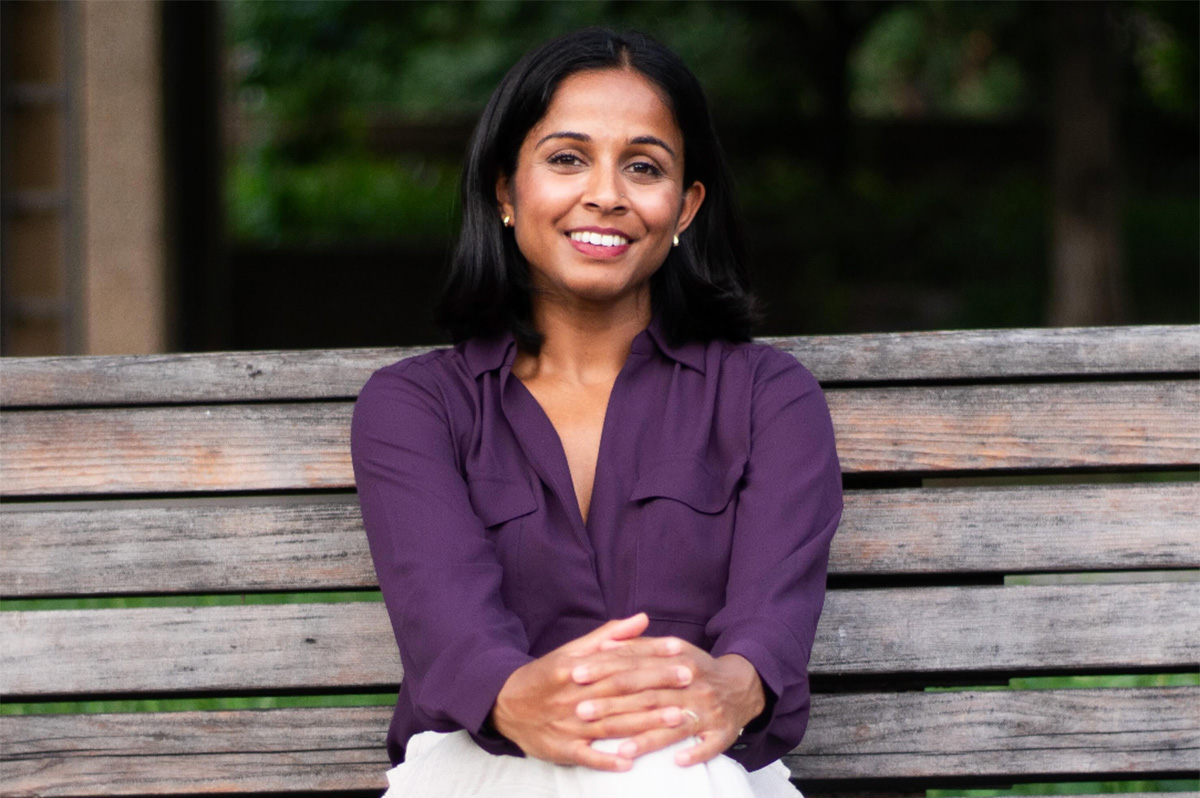
In what appears to be an unprecedented development in local D.C. elections, three known LGBTQ candidates are now running for the open Ward 1 D.C. Council seat in the city’s June 16, 2026, Democratic primary.
Longtime Ward 1 community organizer Aparna Raj, a bisexual woman who identifies herself on her campaign website as a “queer woman of color,” announced her candidacy for the Ward 1 Council seat on Aug. 12 of this year.
The Washington Blade didn’t learn of her status as an out-LGBTQ candidate until late last month when one of her supporters contacted the Blade after publication of the Blade’s story about the second of two gay male candidates running for the Ward 1 Council seat – Ward 1 Advisory Neighborhood Commissioner Miguel Trindade Deramo.
Trindade Deramo’s candidacy announcement on Nov. 18 followed the announcement in July by fellow gay Ward 1 ANC commissioner Brian Footer that Footer is running for the Ward 1 Council seat in the upcoming Democratic primary.
If any of the three Ward 1 LGBTQ candidates were to win the primary and win in the November general election, they would likely become the second LGBTQ member of the D.C. Council. Then gay D.C. Board of Education member Zachary Parker, a Democrat, won election to the Ward 5 Council seat in 2022. Parker, who is up for re-election in 2026, is considered by political observers to have a strong chance of winning the upcoming election.
“Aparna Raj is a community organizer, union member and proud daughter of immigrants,” her campaign website states. “She is running for D.C. Council in Ward 1 because she believes everyone – from Adams Morgan to Park View, from Spring Road to U Street – can and should have what they need to survive and thrive,” the statement on her website continues.
It adds, “Aparna is a renter, a queer woman of color, and a democratic socialist fighting for a better world … She lives in Columbia Heights with her husband, Stuart, and their little dog, Frank.”
In a Dec. 5 interview with the Blade, Raj said she identifies as a bisexual woman and has been a longtime supporter of D.C.’s “queer and trans communities” on a wide range of issues that she says she will continue to address if elected to the Council.
She said she currently works as a communications manager for a nonprofit organization that supports local elected officials across the country on issues related to economic justice.
As the daughter of parents who immigrated to the U.S. from India, Raj said she will continue her work as an advocate for D.C.’s immigrant communities, especially those who live in Ward 1.
“And I feel very strongly that we need someone who will organize and fight for the working class, who will fight for renters and workers and immigrants and families, to not just be able to get by but to be able to live a full life here,” she told the Blade. “Making sure that we’re providing enough for renters and for workers means that is an LGBTQ+ issue,” she said. “That is an issue that benefits the LGBTQ+ community.”
Among the things she will also address as a Council member, Raj said, will be to push for the city to do all it can to counter the policies of the administration of President Donald Trump.
“When the LGBTQ community is so under attack right now and when queer and trans folks are facing homelessness, are making less money on the job than their cis counterparts – when folks are scared about whether they will be able to continue healthcare or be able to hold on to their job through this period, having someone that takes on their landlord, that will stand on picket lines with workers and will certainly fight the Trump administration – all that is an LGBTQ justice issue,” she told the Blade.
Raj, Trindade Deramo, and Footer are among a total of six known candidates so far who are competing in the June 16 Democratic primary for the Ward 1 Council seat.
The other three, who are not LGBTQ, are Ward 1 ANC member Rashida Brown, longtime Ward 1 community activist Terry Lynch, and Jackie Reyes-Yanes, the former director of the Mayor’s Office of Community Affairs.
Similar to Raj, Trindade Deramo and Footer have been involved as community activists in a wide range of local LGBTQ and non-LGBTQ issues as described on their respective campaign websites.
And like all candidates on the ballot for the city’s 2026 primary, the three LGBTQ Ward 1 candidates will be competing for voters under the city’s newly implemented rank choice voting system. Under that system, voters will have the option of designating one of the LGBTQ candidates as their first, second, or third choice for the Council seat,
“I’m really excited about ranked choice voting,” Raj said. “And I think it’s great that there’s so many incredible candidates who are dropping into the Ward 1 race,” she said. “We’ll also be including a lot of voter education into our campaign materials as well since this will be the first year that D.C. is doing ranked choice voting.”
The three LGBTQ Ward 1 candidates are running at a time when local political observers are predicting the largest change in local D.C. elected officials, including the office of mayor and D.C. Council, in decades following the 2026 election. Longtime D.C. Council member Anita Bonds (D-At-Large), announced on Dec. 5 that she will not run for re-election in 2026.
Her announcement came shortly after Mayor Muriel Bowser announced she too is not running for a fourth term in office as mayor and about a month after incumbent Ward 1 Council member Brienne Nadeau (D) announced she is not running for re-election.
Bowser’s announcement prompted speculation that more Council members will run for mayor, some of whom will give up their Council seats if they either win or lose the mayoral race because their respective Council seats are also up for election in 2026.
Thus the 2026 D.C. election shakeup, in addition to bringing about a new mayor, could result in five or six new Council members on the 13-member Council.
Maryland
FreeState Justice launches 501(c)(4) group
FreeState Equality will focus on policy and advocacy
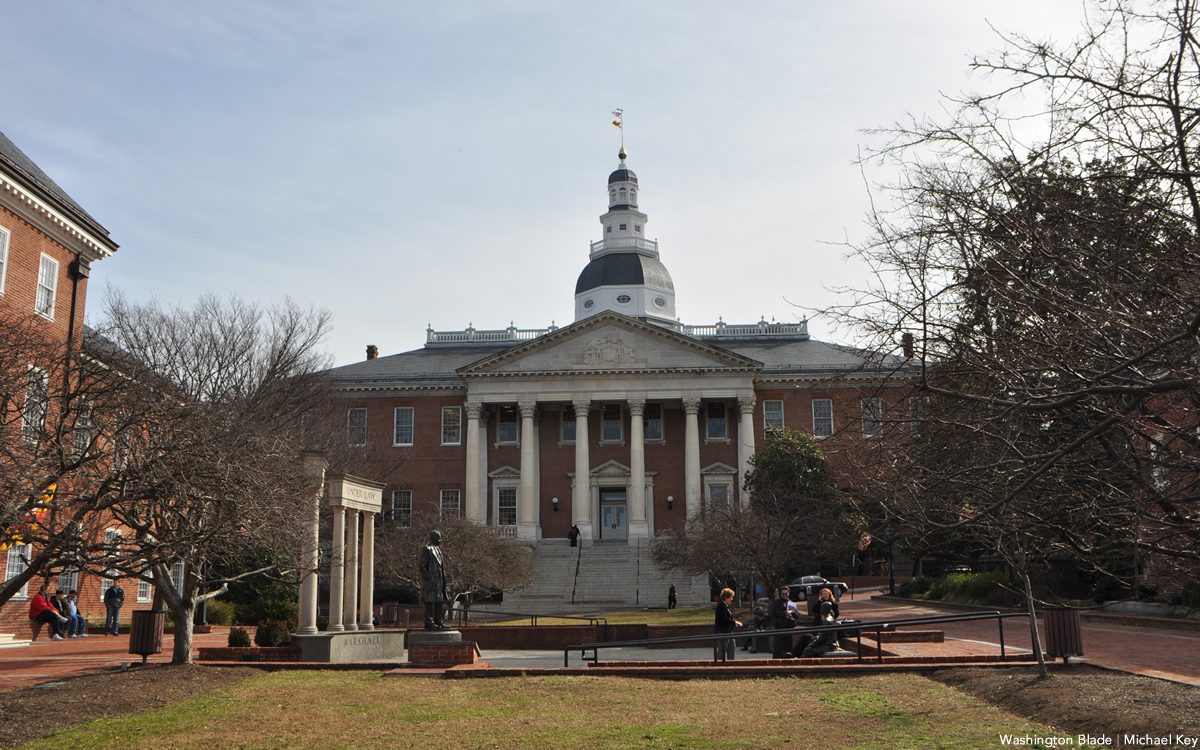
FreeState Justice, an LGBTQ organization that provides legal services, community programs, and public education in Maryland, announced the launch of FreeState Equality on Wednesday.
The new, independent organization intends to pursue advocacy and policy work beyond the legal capability of FreeState Justice, a 501(c)(3) non-profit. FreeState Equality functions as a 501(c)(4) organization, meaning it can partake in political activity.
“We are committed to transparency throughout this process and look forward to continuing our work together in service of LGBTQ+ Marylanders,” said FreeState Justice Executive Director Phillip Westry.
FreeState Equality will take on policy, advocacy, and civic engagement initiatives while FreeState Justice will pursue legal and direct-service work, according to Westry.
While both organizations adhere to similar values, they will feature separate leadership, operations and compliance.
FreeState Equality is hosting its first launch fundraiser on Dec. 10 at the Brass Tap in Baltimore. The event, held from 5-7 p.m., will feature insight from FreeState Equality staff about how Maryland policy can support the state’s LGBTQ community.
Attendees can purchase fundraiser tickets on Zeffy for $25 general admission, which includes a free first drink. The organization also welcomes additional donations.

By LEE O. SANDERLIN, PAMELA WOOD and BRENDA WINTRODE | Maryland House of Delegates Speaker Adrienne A. Jones, the first woman and first person of color to hold her position, stepped down from her leadership post Thursday, effective immediately.
Jones, 71, has been a member of the legislature since 1997 and ascended to the top role in 2019 following the death of longtime House Speaker Michael E. Busch.
Jones held a meeting with top House Democratic leaders Thursday afternoon, sources said, at which she informed them of her decision. In a statement, Jones described the changes of life’s seasons and said she was ready to focus on what lies ahead.
The rest of this article can be found on the Baltimore Banner’s website.



